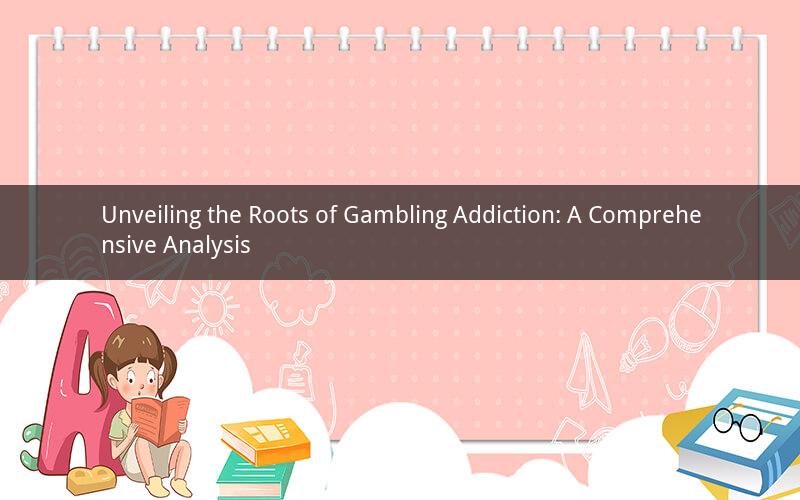
Introduction:
Gambling addiction, also known as problem gambling, is a significant issue affecting millions of individuals worldwide. Understanding the causes behind this addiction is crucial in developing effective prevention and treatment strategies. This article delves into the various factors that contribute to the development of a gambling addiction, aiming to shed light on the complexities of this behavior.
1. Genetic Factors:
Research indicates that genetics play a crucial role in the development of gambling addiction. Studies have shown that individuals with a family history of addiction are more prone to developing gambling problems. Certain genetic predispositions may influence the brain's reward system, making individuals more susceptible to the allure of gambling.
2. Psychological Factors:
Psychological factors, such as low self-esteem, depression, and anxiety, often contribute to the development of gambling addiction. Individuals struggling with these psychological issues may turn to gambling as a means of escapism or as a form of self-medication. The temporary relief and excitement derived from gambling can provide a temporary escape from underlying emotional distress.
3. Social Factors:
Social influences can significantly impact an individual's likelihood of developing a gambling addiction. Peer pressure, exposure to gambling in social settings, and the normalization of gambling behavior can contribute to the development of problem gambling. Additionally, individuals with a history of trauma or abuse may be more vulnerable to the seductive allure of gambling as a coping mechanism.
4. Environmental Factors:
The availability and accessibility of gambling opportunities play a significant role in the development of gambling addiction. Easy access to casinos, online gambling platforms, and the proliferation of gambling advertisements contribute to the normalization and temptation of gambling behavior. Furthermore, the availability of credit and loans can exacerbate the severity of gambling problems.
5. Cognitive Factors:
Cognitive factors, such as cognitive distortions and irrational beliefs, can contribute to the development of gambling addiction. Individuals with a gambling addiction may exhibit cognitive biases, such as the illusion of control, overconfidence, and the belief that they can predict outcomes. These cognitive distortions can lead to excessive gambling behavior and a disregard for the potential consequences.
6. Developmental Factors:
Early exposure to gambling, during adolescence or childhood, can increase the risk of developing a gambling addiction later in life. Research suggests that individuals who begin gambling at a young age may be more susceptible to the addictive nature of gambling. Additionally, developmental factors, such as family dynamics and upbringing, can also influence the likelihood of developing a gambling addiction.
7. Economic Factors:
Financial difficulties, debt, and economic stress can contribute to the development of gambling addiction. Individuals facing financial challenges may turn to gambling as a means of trying to solve their problems or as a form of escapism. The allure of winning money to alleviate financial strain can further entrench the addiction.
8. Cultural Factors:
Cultural factors, including the societal acceptance of gambling and the portrayal of gambling in media, can influence the development of gambling addiction. Cultures that endorse gambling as a leisure activity or as a means of entertainment may have higher rates of problem gambling. Additionally, the presence of gambling in religious or cultural practices can also contribute to the normalization of gambling behavior.
9. Personal Factors:
Personal factors, such as impulsivity, thrill-seeking behavior, and the presence of other addictive behaviors, can contribute to the development of gambling addiction. Individuals who have a predisposition towards risk-taking and seek out thrilling experiences may be more susceptible to the allure of gambling.
10. Treatment and Support:
Recognizing the causes of gambling addiction is essential in providing effective treatment and support. Treatment approaches may include cognitive-behavioral therapy, family therapy, and support groups. Understanding the underlying causes can help individuals develop strategies to overcome their addiction and lead a healthier, more fulfilling life.
Questions and Answers:
1. Can genetics alone cause someone to have a gambling addiction?
Answer: While genetics play a role in the development of gambling addiction, they are not the sole cause. Multiple factors, including psychological, social, and environmental factors, contribute to the development of problem gambling.
2. Is gambling addiction a mental health disorder?
Answer: Yes, gambling addiction is recognized as a mental health disorder by the American Psychiatric Association. It is classified as an addictive disorder and is characterized by persistent and recurrent gambling behavior that leads to significant distress or impairment.
3. Can social support help in overcoming a gambling addiction?
Answer: Absolutely, social support can be instrumental in overcoming a gambling addiction. Support from family, friends, and support groups can provide individuals with the encouragement, guidance, and resources needed to overcome their addiction.
4. Is there a cure for gambling addiction?
Answer: While there is no definitive cure for gambling addiction, effective treatment and support can significantly reduce the severity of symptoms and help individuals regain control over their lives. Treatment approaches aim to address the underlying causes and develop strategies to prevent relapse.
5. How can individuals seek help for gambling addiction?
Answer: Individuals can seek help for gambling addiction through various channels. This includes contacting mental health professionals, joining support groups, or seeking assistance from organizations specializing in gambling addiction. It is important to take the first step towards seeking help and seeking support from trusted individuals.